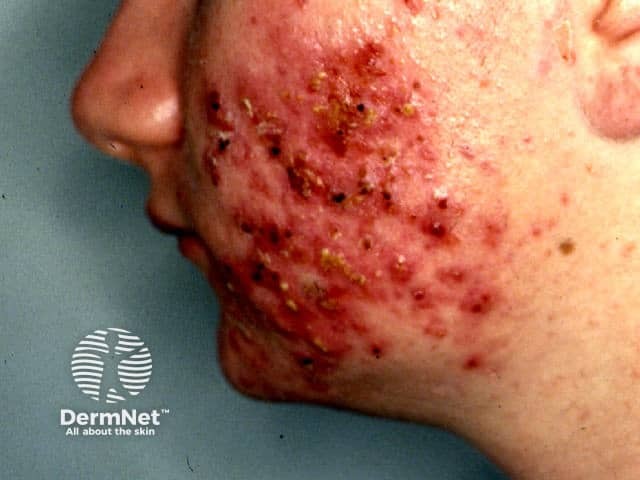Main menu
Common skin conditions

NEWS
Join DermNet PRO
Read more
Quick links
Infections Follicular disorder
Author: Dr Amanda Oakley Dermatologist, Hamilton, New Zealand, 1999. Reviewed and updated by Vanessa Ngan, Staff Writer; Copy Editor: Clare Morrison, April 2014.
Gram-negative folliculitis is an acne-like disorder caused by a bacterial infection. Gram-negative bacteria include Escherichia coli, Pseudomonas aeruginosa, Serratia marcescens, Klebsiella and Proteus species.
The term "Gram negative" refers to the staining pattern of the organisms in the laboratory. Certain bacteria do not take up a stain known as "Gram".
Gram-negative folliculitis may result from long-term treatment of acne with tetracycline or topical antibiotics.
Other skin conditions due to Gram-negative bacteria include:
Gram-negative folliculitis is a pustular rash resembling acne. It is often mistaken as a worsening of acne as it usually occurs in patients with existing acne.
In about 80% of patients, Gram-negative folliculitis causes superficial pustules with relatively few papules and comedones. These lesions are usually caused by Klebsiella, Escherichia and Serratia species.
In about 20% of patients with Gram-negative folliculitis, lesions are deep, nodular and cyst-like. These are caused by Proteus species, which are able to invade deeply into the skin and create pus-filled abscesses and cysts.
Gram-negative folliculitis lesions are usually found around the area of the upper lip under the nose, to the chin and cheeks.

Gram-negative folliculitis

Spa pool folliculitis
Poor response of a pustular rash to usual anti-acne antibiotics may give rise to suspicion that an unusual organism may be present. The diagnosis of Gram-negative folliculitis is made by microscopy / cytology. The bacteria appear red or pink with Gram stain.
Bacterial culture identifies which species is responsible for the infection. The bacteria are tested for antibiotic sensitivity, as this differs among them.
Gram-negative folliculitis usually clears promptly with:
Spa-pool folliculitis usually clears within a few days without treatment.